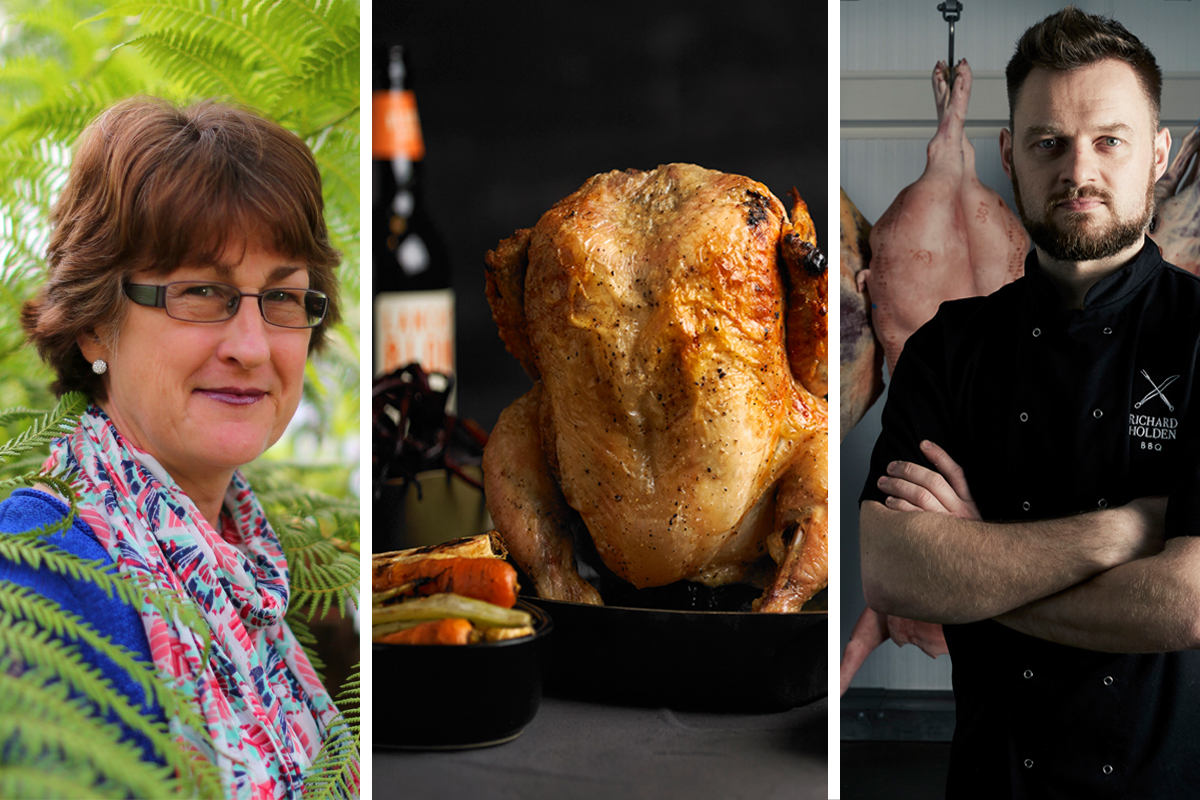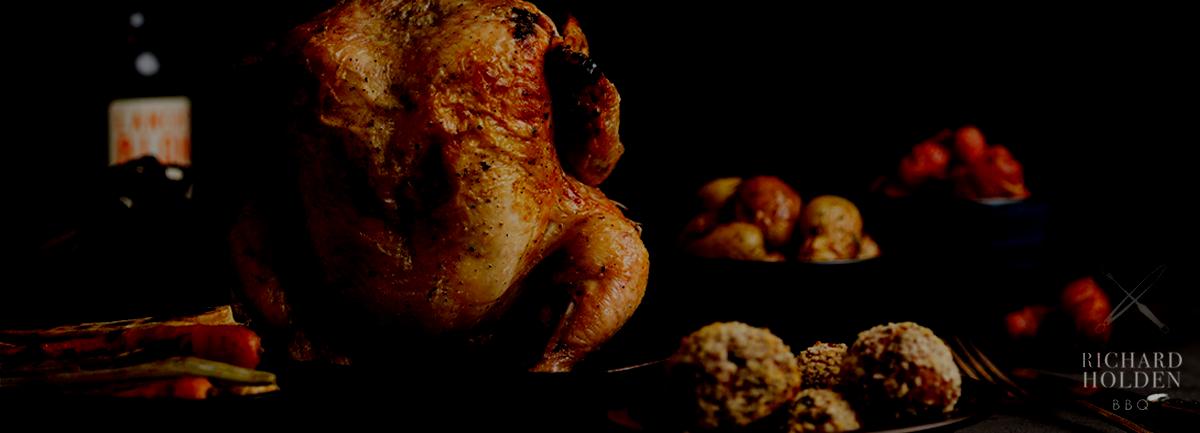One of my all-time favourite dishes is roast chicken – until now I thought it was difficult to cook a roast chicken on the BBQ – but not so. With the help of Richard Holden BBQ I can now cook what must be the most delicious and juiciest roast chicken ever – all on the BBQ. My friends were very impressed – try out the following simple steps and you too can entertain in style!
Ali: Richard, the beer can chicken you cooked for us at your last BBQ demo was, without exaggeration, one of the best things I’ve ever tasted. Since then I’ve cooked it for myself – if I can cook it, anybody can – so I’m keen to share this technique with everybody else. Firstly, why’s it called beer can chicken when I noticed that you cooked it on a chicken throne /chicken sitter?
- until now I thought it was difficult to cook a roast chicken on the BBQ – but not so.
Ali Durnford
Richard: Traditionally beer can chicken was cooked on an open can of beer, which is where the name comes from, but as with most things people have developed their own “new and improved versions” that do a few extra things. Most BBQ manufacturers have a range of accessories which includes a throne, or chicken roaster of some kind, but the premise is the same. The chicken sits on some kind of support that has a reservoir of liquid inside to produce steam.
Ali: Why does cooking chicken this way result in such delicious juicy meat? And do you have to use beer?
Richard: Well, as just mentioned, the chicken sits over a reservoir of liquid, which is heated by the BBQ to produce steam. The steam rises into the cavity of the bird and helps to keep it moist as well as slightly cooking it from the inside out. One of the other reasons why meats roasted outside on your BBQ are juicier is because of the air outside the house. In the UK we live in a humid or damp climate and it’s this damp air that’s drawn into the chamber of the BBQ and helps keep meats from drying out.
The steam rises into the cavity of the bird and helps to keep it moist as well as slightly cooking it from the inside out.
Richard Holden
You don’t have to just use beer - you can use many liquids. I used the Traeger chicken throne in the demo you mentioned and this allows you to experiment with everything from beers and lagers, to wine, cider, or homemade infusions of herbs and spices; your imagination is the only limit. I know that in Germany it’s common for people to use some Jagermeister because of the botanicals and herbs used to make the drink!
Ali: I’ve already bought my chicken (as always, I got mine from James of Shepperton, our local Q Guild butcher), I’ve got a chicken throne and some beer (which I haven’t drunk yet!). What’s the first step?
Richard: The world's your oyster really, or chicken in this case! If I’m showing people what a chicken roasted on the BBQ can taste like, I’ll often just use a Maldon sea salt and freshly ground black pepper with a little olive oil. The oil helps the skin turn beautiful and crispy and makes the seasonings stick to the chicken. You could go for a Caribbean inspired roast by mixing up your favourite jerk chicken seasoning and leaving it to infuse the bird overnight, or I quite often like to use fresh herbs. I like to chop a handful of fresh thyme, zest a lemon, chop in a few anchovies for a salty savoury note, a few finely chopped cloves of garlic, salt, pepper and enough olive oil to bring it together in a paste. I then rub this all over the chicken, making sure to coat the back of the legs and all around the wings.
I’m getting carried away with flavour options here but clearly there are plenty! Once the chicken is seasoned and left to infuse as necessary, pour in enough of your chosen liquid to a depth of an inch in the bottom of the throne. This will be enough for a 1½ hr cook without running dry, but not so much that it will take all that time to come up to the boil.
Open the cavity of the chicken and guide it onto the top of the throne so its legs are pointing down and the breasts are at the top of the bird. The last thing I would do is take a quarter wedge of lemon and just place that into the neck of the chicken as this will help prevent excess steam escaping the cavity while it’s cooking.

Ali: And while I’m doing that, what temperature does the BBQ need to be heated to?
Richard: A general roasting temperature of 180c is fine for this and on a BBQ you want to set up for indirect heat. This means there is no heat directly underneath the spot on the grate where you have positioned the roast, and the heat rotates inside the chamber of the BBQ in the same way it would an oven with the door closed. Chicken is a very lean meat and can dry out if cooked at too high a temperature. Cook around 180c, use the same 20 minutes per pound plus 20 minutes guide, but use a digital temperature probe to make sure the internal temp of the bird reaches 75c at the thickest parts. For beginners and good practice I check both breasts and both legs. Once all 4 parts are 75c or higher the chicken, take the chicken off the BBQ.
Ali: And when it’s cooked, does chicken need to rest in the same way as red meat?
Richard: It absolutely does because during the cooking process all of the moisture in the meat is being driven to the centre of the bird. If it is carved within minutes of coming off the BBQ those juices will be lost to your chopping board. I heard a chef recently say that as a guide, if the roast is too hot to handle with bare hands, it hasn’t had enough time to rest. By letting it rest the muscle will relax, the juices will redistribute and be reabsorbed by the meat. Some will be lost but they can be spooned over the food or added to a sauce.
Ali: Thanks Richard – as ever, we really appreciate the way you’re so keen to share the fun and expertise of cooking outdoors. Now …… have we any beer left to drink?!
BBQ tuition by Richard Holden BBQ
